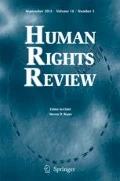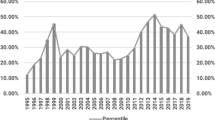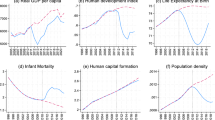Abstract
This article offers a thorough analysis of the unintended impact economic sanctions have on political repression—referred to in this study as the level of the government respect for democratic freedoms and human rights. We argue that economic coercion is a counterproductive policy tool that reduces the level of political freedoms in sanctioned countries. Instead of coercing the sanctioned regime into reforming itself, sanctions inadvertently enhance the regime’s coercive capacity and create incentives for the regime’s leadership to commit political repression. Cross-national time series data support our argument, confirming that the continued use of economic sanctions (even when aimed at promoting political liberalization and respect for human rights) will increase the level of political repression. These findings suggest that both scholars and policy makers should pay more attention to the externalities caused by economic coercion.






Similar content being viewed by others
Notes
These countries include Afghanistan, Angola, Cambodia, Former Yugoslavia, Haiti, Iraq, Liberia, Libya, North Korea, Rwanda, Sierra Leone, Somalia, and Sudan.
Because most of the sanctioned regimes tend to be less democratic and have no popular legitimacy, their accommodation is perceived in the society as a sign of weakness. In liberal democratic systems, on the other hand, the same accommodation might be regarded as a positive step to avoid the escalation of crisis with other countries. We are grateful to Steven Roper for bringing this to our attention.
In the original dataset, the 13-point scale ranges from 1 to 7, where lower values indicate more democratic freedom. In this analysis, we recoded the index so that higher values indicate a higher level of civil and political liberties.
The definition of these four rights is available at the CIRI web site (Cingranelli and Richards 2004). Each of the four physical integrity variables is originally coded as an ordinal variable on a three-point scale with frequent violations (50 or more incidences), some violations (one through 49), and no violations.
Thus, only a few extreme cases, such as North Korea and Cuba, are excluded from our analysis.
Note that the tables are based on the entire length of the sanctions rather than the 15 years we use in the graphical analysis. The results do not change if we limit the data to 15 years.
According to a means difference test, the increasing political repression is statistically significant.
References
Abouharb, M. Rodwan, and David L. Cingranelli. 2006. “The Human Right Effects of World Bank Structural Adjustment, 1981–2000.” International Studies Quarterly 50: 233–262.
Allen, Susan H. 2004. “Rallying Cry? Economic Sanctions and the Domestic Politics of the Target State.” PhD dissertation, Emory University.
Andreas, Peter. 2005. “Criminalizing Consequences of Sanctions: Embargo Busting and Its Legacy.” International Studies Quarterly 49: 335–360.
Apodaca, Clair. 2001. “Global Economic Patterns and Personal Integrity Rights after the Cold War.” International Studies Quarterly 45: 587–602.
Armijo, Leslie E. 1999. “Mixed Blessing: Expectations About Foreign Capital Flows and Democracy in Emerging Markets.” In Financial Globalization and Democracy in Emerging Markets, Leslie E. Armijo, eds. New York: Palgrave.
Baldwin, David A. 1985. Economic Statecraft. Princeton: Princeton University Press.
Barber, James. 1979. “Economic Sanctions as a Policy Instrument.” International Affairs 5:367–384.
Blanton, Shannon L. 1999. “Instruments of Security or Tools of Repression? Arms Imports and Human Rights Conditions in Developing Countries.” Journal of Peace Research 36: 233–244.
Bueno de Mesquita, Bruce, Alastair Smith, Randolph M. Siverson, and James D. Morrow. 2003. The Logic of Political Survival. Cambridge: MIT Press.
Carothers, Thomas, and Marina Ottaway. 2005. Uncharted Journey: Promoting Democracy in the Middle East. Washington, DC: Brookings Institution Press.
Carothers, Thomas. 1999. Aiding Democracy Abroad: The Learning Curve. Washington, DC: Carnegie Endowment for International Peace.
Cingranelli, David L., and David L. Richards. 2004. The Cingranelli–Richards (CIRI) Human Rights Database. http:www.humanrightsdata.com.
Cortright, David, and George A. Lopez. 2000. “Learning from the Sanctions Decade.” Global Dialogue 2:11–24.
Cortright, David, and George A. Lopez, eds. 1995. Economic Sanctions: Panacea or Peacebuilding in a Post-Cold War World? Boulder, CO: Westview.
Cortright, David, Alistair Millar, and George A. Lopez. 2001. Smart Sanctions: Restructuring UN Policy in Iraq. Goshen, IN: Fourth Freedom Forum.
Davenport, Christian. 1995. “Assessing the Military’s Influence on Political Repression.” Journal of Political and Military Sociology 23: 119–144.
Drezner, Daniel W. 1998. “Conflict Expectations and the Paradox of Economic Coercion.” International Studies Quarterly 42: 709–731.
Drury, A. Cooper. 2005. Economic Sanctions and Presidential Decisions. New York: Palgrave.
Drury, A. Cooper. 2001. “Sanctions as Coercive Diplomacy: The U. S. President’s Decision to Initiate Economic Sanctions.” Political Research Quarterly 54: 485–508.
Drury, A. Cooper. 1998. “Revisiting Economic Sanctions Reconsidered.” Journal of Peace Research 35: 497–509.
Drury, A. Cooper, and Yitan Li. 2006. “U.S. Economic Sanction Threats against China: Failing to Leverage Better Human Rights.” Foreign Policy Analysis 2: 307–324.
Fearon, James D. 1994. “Domestic Political Audiences and the Escalation of International Disputes.” American Political Science Review 88: 577–92.
Freedom House. 2004. Freedom in the World: Comparative Rankings 1976–2004. Washington, DC: Freedom House.
Galtung, Johan. 1967. “On the Effects of International Economic Sanctions: With Examples from the Case of Rhodesia.” World Politics 19: 378–416.
Gasiorowski, Mark. 1995. “Economic Crisis and Political Regime Change: An Event History Analysis.” American Political Science Review 89: 882–97.
George, Alexander. 1991. Forceful Persuasion: Coercive Diplomacy as an Alternative to War. Washington, DC: United States Institute for Peace.
Gibbons, Elizabeth D. 1999. Sanctions in Haiti: Human Rights and Democracy under Assault. Westport, CT: Praeger.
Gleditsch, Kristian, and Michael D. Ward. 2006. “Diffusion and the International Context of Democratization.” International Organization 60: 911–33.
Goldstone, Jack, Robert Bates, and David Epstein. 2000. State Failure Task Force: Phase III Findings. McLean, VA: SAIC.
Gurr, Ted R. 1968. “A Causal Model of Civil Strife: A Comparative Analysis Using New Indices.” American Political Science Review 62: 1104–24.
Haas, Richard N. 1997. “Sanctioning Madness.” Foreign Affairs 76: 74–85.
Hafner-Burton, Emilie. 2005a. “Right or Robust? The Sensitive Nature of Government Repression in an Era of Globalization.” Journal of Peace Research 42: 679–698.
Hafner-Burton, Emilie. 2005b. “Trading Human Rights: How Preferential Trade Agreements Influence Government Repression.” International Organization 59: 593–629.
Hufbauer, Gary, Jeffrey Schott, and Kimberly A. Elliott. 1990. Economic Sanctions Reconsidered: History and Current Policy, 2nd. ed. Washington, DC: Institute for International Economics.
Hufbauer, Gary, Jeffrey Schott, Kimberly A. Elliott, and Barbara Oegg. 2008. Economic Sanctions Reconsidered: History and Current Policy, 3rd ed. Washington, DC: Patterson Institute for International Economics.
Huntington, Samuel. 1991. The Third Wave: Democratization in the Late Twentieth Century. Norman: Oklahoma University Press.
Kaempfer, William H., and Anton D. Lowenberg. 1988. “The Theory of International Economic Sanctions: A Public Choice Approach.” American Economic Review 78: 786–793.
Kirshner, Jonathan. 1997. “The Microfoundations of Economic Sanctions.” Security Studies 6: 32–64.
Knack, Stephen. 2004. “Does Foreign Aid Promote Democracy?” International Studies Quarterly 48: 251–66.
Kopstein, Jeffrey, and David Reilly. 2000. “Geographic Diffusion and the Transformation of the Postcommunist World.” World Politics 53: 1–37.
Mack, Andrew, and Asif Khan. 2000.”The Efficacy of UN Sanctions.” Security Dialogue 31: 279–292.
Marinov, Nikolay. 2005. “Do Economic Sanctions Destabilize Country Leaders?” American Journal of Political Science 49: 564–576.
Meernik, James. 1996. “United States Military Intervention and the Promotion of Democracy.” Journal of Peace Research 33: 391–402.
Meyer, William H. 1996. “Human Rights and MNCs: Theory versus Quantitative Analysis.” Human Rights Quarterly 18: 368–97.
Mitchell, Neil J., and James McCormick. 1988. “Economic and Political Explanations of Human Rights Violations.” World Politics 40: 476–498.
Morgan, T. Clifton, and Valerie L. Schwebach. 1997. “Fools Suffer Gladly: The Use of Economic Sanctions in International Crises.” International Studies Quarterly 41: 27–50.
Pape, Robert A. 1997. “Why Economic Sanctions Do Not Work.” International Security 22: 90–136.
Peceny, Mark. 1999. Democracy at the Point of Bayonets. University Park, PA: Pennsylvania State University.
Peksen, Dursun. 2009. “Better or Worse? The Effect of Economic Sanctions on Human Rights.” Journal of Peace Research 46: 59–77.
Peksen, Dursun, and A. Cooper Drury. 2008. “Coercive or Corrosive: The Negative Impact of Economic Sanctions on Democracy.” Working paper.
Pevehouse, Jon. 2002a. “Democracy from the Outside-In? International Organizations and Democratization.” International Organization 56: 515–49.
Pevehouse, Jon. 2002b. “With a Little Help from My Friends? Regional Organizations and the Consolidation of Democracy.” American Journal of Political Science 46: 611–26.
Pickering, Jeffrey, and Mark Peceny. 2006. “Forging Democracy at Gunpoint.” International Studies Quarterly 50: 539–560.
Pickering, Jeffrey, and Emizet F. Kisangani. 2006. “Political, Economic, and Social Consequences of Foreign Military Intervention.” Political Research Quarterly 59: 363–376.
Poe, Steven C., and Neal Tate. 1994. “Repression of Human Rights to Personal Integrity in the 1980s: A Global Analysis.” American Political Science Review 88: 853–872.
Poe, Steven C., Neal Tate, and Linda C. Keith. 1999. “Repression of the Human Right to Personal Integrity Revisited.” International Studies Quarterly 43: 291–313.
Reuther, David E. 1995. “UN Sanctions against Iraq.” In Economic Sanctions: Panacea or Peacebuilding in a Post-Cold War World, Cortright, David and George Aasa Lopez, eds. Boulder, CO: Westview.
Richards, David, Ronald Gelleny, and David Sacko. 2001. “Money With A Mean Streak? Foreign Economic Penetration and Government Respect for Human Rights in Developing Countries.” International Studies Quarterly 45: 219–39.
Rowe, David M. 2000. “Economic Sanctions, Domestic Politics and the Decline of Rhodesian Tobacco, 1965–79.” In Sanctions as Economic Statecraft: Theory and Practice, Steve Chan and A. Cooper Drury, eds. Basingstoke, UK: Macmillan.
Rudra, Nita. 2005. “Globalization and the Strengthening of Democracy in the Developing World.” American Journal of Political Science 49: 704–30.
Schultz, Kenneth. 1998. “Domestic Opposition and Signaling in International Crises.” American Political Science Review 92: 829–44.
Thyne, Clayton L. 2006. “ABC’s, 123’s and the Golden Rule: The Pacifying Effect of Education on Civil Conflict, 1980–1999.” International Studies Quarterly 50: 733–754.
Tsebelis, George. 1990. “Are Sanctions Effective? A Game-Theoretic Analysis.” Journal of Conflict Resolution 34: 3–28.
Wallensteen, Peter. 1968. “Characteristics of Economic Sanctions.” Journal of Peace Research 5: 248–267.
Weiss, Thomas G. 1999. “Sanctions as a Foreign Policy Tool: Weighing Humanitarian Impulses.” Journal of Peace Research 36: 499–510.
Weiss, Thomas G., David Cortright, George A. Lopez, and Larry Minear, eds. 1997. Political Gain and Civilian Pain: Humanitarian Impacts of Economic Sanctions.. Lanham, MD: Rowman and Littlefield.
Wintrobe, Ronald. 1998. The Political Economy of Dictatorship. Cambridge, Cambridge University Press.
Wintrobe, Ronald. 1990. “The Tinpot and the Totalitarian: an Economic Theory of Dictatorship.” American Political Science Review 84: 849–872.
Wood, Reed M. 2008. “A Hand upon the Throat of the Nation”: Economic Sanctions and State Repression, 1976–2001.” International Studies Quarterly 52: 489–513.
Author information
Authors and Affiliations
Corresponding author
Rights and permissions
About this article
Cite this article
Peksen, D., Drury, A.C. Economic Sanctions and Political Repression: Assessing the Impact of Coercive Diplomacy on Political Freedoms. Hum Rights Rev 10, 393–411 (2009). https://doi.org/10.1007/s12142-009-0126-2
Published:
Issue Date:
DOI: https://doi.org/10.1007/s12142-009-0126-2




